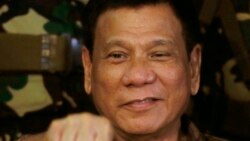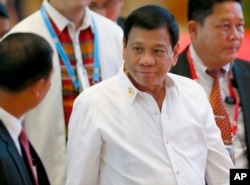Philippine President Rodrigo Duterte is no stranger to controversy, having called both the Pope and U.S. President Barack Obama "sons of whores." However it was when he championed his war on drugs and crime by likening it to Hitler and the Holocaust that he earned international condemnation.
The German foreign ministry called in the Philippine envoy to say, “Any comparison of the singular atrocities of the Holocaust with anything else is totally unacceptable.”
Duterte apologized for the remark, saying it was not his intention to "derogate the memory of the six million Jews murdered by the Germans." But walking the comment back didn’t prevent Duterte from telling the United States State Department and President Obama they could "go to hell."
Jonathan Miller, East Asia Fellow with EastWest Institute says the comments are becoming not only "a problem for him as the leader of the Philippines," but also "a larger problem for the Philippines' relationships internationally."
'Reckless diplomatic actions'
Miller says the latest gaffe is just one of many reckless diplomatic actions. Other analysts blame Duterte’s policies as the reason the nation’s stock market has slumped and the peso has fallen to a seven-year low.
Guenter Taus, the head of the European Chamber of Commerce in the Philippines, said the uncertainty over Duterte’s plans has led some some companies that had once planned to begin operations in the Philippines to back off to wait and see what happens. He declined to name which companies.
Curtis Chin, Asia Fellow at the Milken Institute notes that may be the present situation, but not necessarily indicative of the future.
"These are really short term changes, they aren’t necessarily going to be locked into the long term. In the long term the Philippine will remain a vibrant community and I believe one of the key leaders in the ASEAN region,” noting that he feels that “markets are adjusting still to Duterte’s style.”
And while the markets and international community adapt to Duterte’s style, Chin says that all things being equal, the business of politics is local and that’s where President Duterte is focusing his actions.
“Traditionally when you look at the Philippines [polls], usually at the top of voter concerns is poverty. The Philippines it is not a wealthy country, but now what has moved to the top of the of the polling is crime. President Duterte is not doing anything he didn’t say he was going to do during the campaign,” said Chin.
New alliances with China, Russia
President Duterte also has said he’s open to forming new alliances with China and Russia, even going so far as to say he’ll “break up” with the United States.
On Facebook, Foreign Affairs Secretary Perfecto Yasay wrote, “Breaking away from the shackling dependency of the Philippines to effectively address both internal and external security threats has become imperative in putting an end to our nation's subservience to United States' interests.”
Furthermore, the Associated Press reported Defense Secretary Delfin notified the U.S. military that the Philippines requested military personnel operating drones in the Mindanao region to leave and that Duterte planned to halt the 28 annual joint military exercises.
"For as long as I am there, do not treat us like a doormat because you'll be sorry for it. I will not speak with you. I can always go to China,” said President Duterte.
Speaking to reporters, John Kirby, U.S. State Department noted, “We think comments like this, whether they are or will be backed up by actual action or not, are really at odds with the closeness of the relationships that we have with the people of the Philippines and which we fully intend to continue.”
No desire to disconnect
Miller believes these remarks are attempts at leveraging his relationships internationally. "My sense still is that the Philippines has no strong desire to disconnect itself with the U.S. alliance - of course there’s a lot of rhetoric and a lot of talk, and there’s no question that the U.S.-Philippine alliance has been on a decline since Duterte took over, but I still think he does recognize the value and need for that."
However, "depending what comes out of his visit to China and relationship with Russia, this is going to have an adverse effect on their belief in their relationship with the U.S. and the alliance."
Chin says with Duterte what “will be key is when those comments actually turn into policy changes.” Something that now appears to be occurring.








